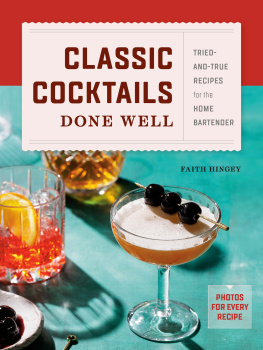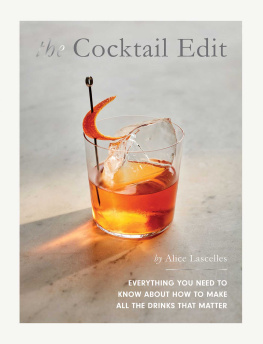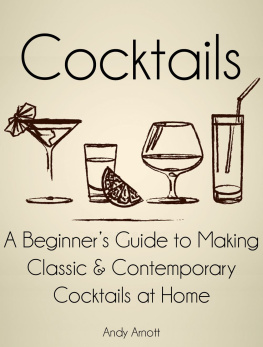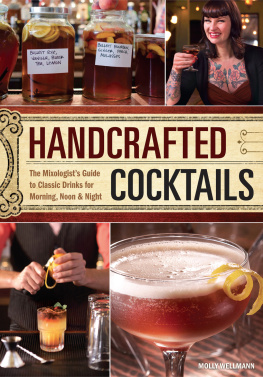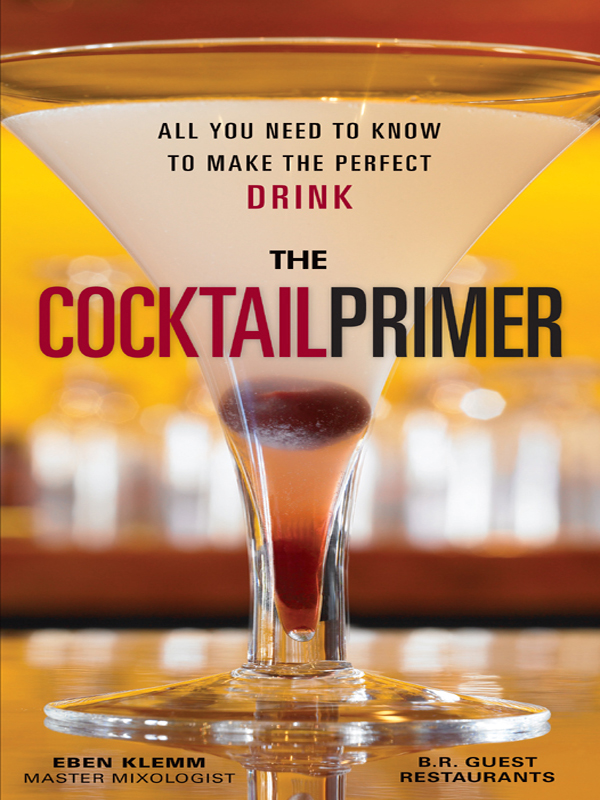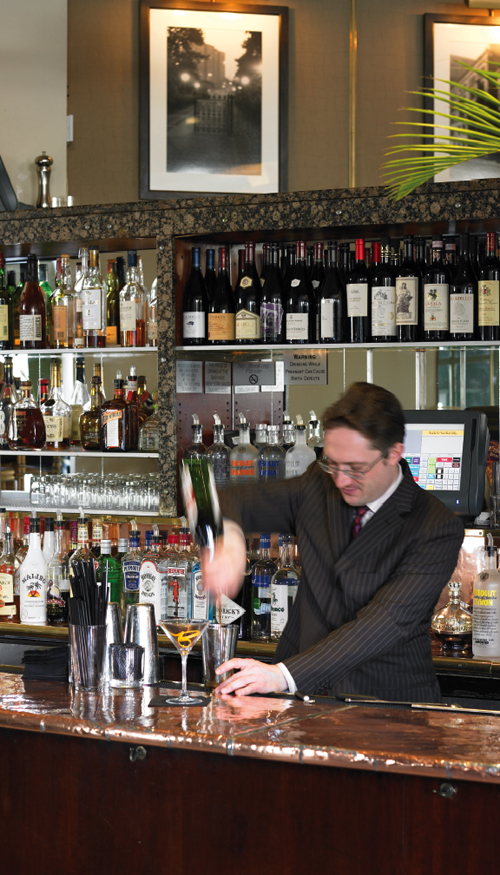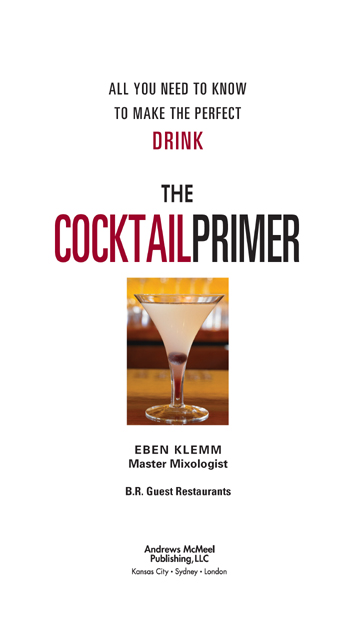CONTENTS
Chapter 1
GETTING STARTED
Chapter 2
MARTINIS CHILDREN
Chapter 3
BEYOND MANHATTANS
Chapter 4
THE SIMPLE SOURS
Chapter 5
THE COMPLEX SOURS
Chapter 6
MUDDLED DRINKS
Chapter 7
HIGHBALLS,
INTRODUCTION
Since the turn of the millennium , there has been a shift in how we think about crafting and, most important, consuming mixed drinks. What had been considered a mere beverage afterthought during the past three or four generations has now assumed as much creativity, inventiveness, and discipline as any other aspect of a good restaurant, bar, or nightclub. It is a given for most places to offer signature cocktails thoughtfully composed of fresh and exciting ingredients. No longer content with beer, wine, and vodka and tonics, increasingly sophisticated cocktail enthusiasts are demanding new and interesting drinks.
What this means is that when you hit the town, you have a far better chance of imbibing something delicious than anyone did fifty years ago. Even if you dont frequent bars and restaurants that serve a variety of cocktails, you are at least aware of the cocktail world celebrated in media and promoted heavily by liquor companies. Restaurants hire consultants to design drinks and train staff. Professional bartenders are expected to know how to make any specialty cocktail on the horizon and to stock a vast array of ingredients and garnishes at their bar. They are far more passionate about food, wine, beer, and service than their predecessors ever were. And their guests expect it.
Bartenders have approached the rediscovery of the classic American craft of making a great cocktail with amazing diversity. Some look directly at mixology as described in books from as far back as a hundred years ago; some look to local and seasonal ingredients and to the explosion in availability of new and formerly obscure ingredients to create fanciful drinks; and still others seize upon the culinary techniques developed by the worlds most innovative chefs and translate them to the bar.
As the head bartender for B.R. Guest Restaurants, I develop drinks for a multitude of different restaurant conceptsfrom Dos Caminos Mexican restaurants, where we create margaritas by the thousands, to high-volume seafood and Asian restaurants, where the cocktails must reflect global and seasonal influences. I have had a chance to meet and work with some pioneers of modern mixology and to exchange ideas with the men and women who are as passionate about cocktails as I am; to visit significant bars and distilleries; and, of course, more important, to taste their magical liquid innovations. Yet what excites me most is to collaborate with the hundreds of men and women I work with every day. I learn alongside them not just what makes a good drink but what makes a good drink work.
this book
On the heels of this cocktail renaissance has come a veritable avalanche of cocktail books, as varied as the inspirations behind them. Any decent bookstore features a whole shelf of them, and every home furnishing store has a rack of them near the register.
So why on earth another one?
Ive written and rewritten training manuals for our bartenders to establish both conceptwide and companywide consistency. I have turned to the dozens of cocktail books I have on my own shelf for help. All of them have a distinct point of view, and many are quite excellent, but Ive found all but a few lacking.
Most cocktail books are encyclopedic, either in breadth (A Thousand and One Cocktails) or in depth (Margaritas for Every Occasion). Most bartenders will tell you that they really have to recall only a couple dozen cocktail recipes because thats all people ever order. While this may be true, it is difficult to introduce and train staff about new cocktails without at least some implicit knowledge of their origin. And if these encyclopedic texts are somewhat off-putting within a professional scenario, where almost every imaginable spirit and ingredient is available, they are doubly confusing, I imagine, for the home bartender. Which ingredients are important to keep on hand? Where do I start? Will I like it?
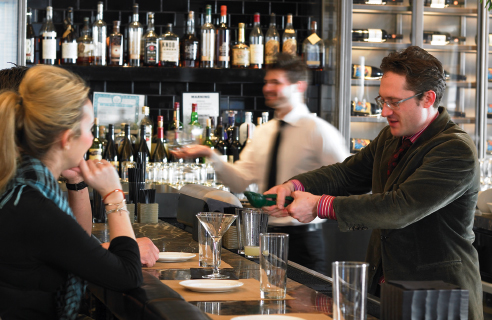
During my first year at B.R. Guest Restaurants, I tried to teach understandably skeptical bartenders the idea of drinks containing up to eight ingredients. The drinks were good, but a little difficult to learn and then reproduce consistently. The challenge was to make any drink I came up with fit within the concept of the twenty or so classic cocktails with which most people are comfortable.
A huge and thorough cocktail book usually arranges drinks either alphabetically or by spirit. Neither system does the aspiring cocktail enthusiast any good, because neither makes any attempt to tell you what the drink tastes like. Imagine a cookbook with recipes arranged from Avgolemono Soup to Zucchini Parmesan rather than by course. Youd have no idea where to begin. A book arranged by spirits assumes somehow that one ingredient defines the whole flavor profile of the cocktail. A martini and a gimlet both claim gin as their primary ingredient, but they do not taste at all alike and most likely would be enjoyed under very different circumstances. I enjoy a martini when I crave a cold and complex wave of alcohol washed over me, but I enjoy a gimlet when I need the refreshing spark of lime to soothe me after a hot day.
Inspired by one book, Gary Regans Joy of Mixology, which is the first modern cocktail book to arrange drinks in families, I learned to think of all drinks, including specialty drinks, as descendants of very basic concepts. In the same way that in classic French cooking Nantua sauce, soubise, and Mornay are all children of bchamel, I will argue that the cosmopolitan, the margarita, and the sidecar all descend from a common concept and so are more related in flavor to one another than any of their individual ingredients might suggest. What I have discovered from teaching hundreds of classes is that cocktail recipes do not exist in a vacuum. Rather, almost every drink we can think to order or whip up at home is related to one of half a dozen master drinks. My goal in this book is to tell you to forget about the hundreds of drinks, and focus on the particulars. Understanding and appreciating these will propel you toward a mastery of any other drink you like.


